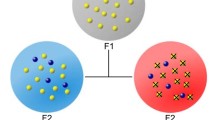Abstract.
The disease outcome in malaria caused by the protozoan parasite Plasmodium is influenced by host genetic factors. To identify host genes conferring resistance to infection with the malaria parasite, we undertook chromosomal mapping using a whole-genome scanning approach in cross-bred mice. NC/Jic mice all died with high parasitemia within 8 days of infection with 1×105 parasitized erythrocytes. In contrast, 129/SvJ mice all completely excluded malaria parasites from the circulation and remained alive 21 days after infection. We performed linkage analysis in backcross [(NC/Jic×129/SvJ)×NC/Jic] mice. The Pymr (Plasmodium yoelii malaria resistance) locus was mapped to the telomeric portion of mouse Chromosome (Chr) 9. This locus controls host survival and parasitemia after infection. The Char1 locus (P. chabaudi resistance locus 1), controlling host survival and peak parasitemia in P. chabaudi infection, was previously mapped to the same region. This host resistance locus mapping to Chr 9 may represent a ubiquitous locus controlling susceptibility to rodent malaria. Elucidation of the function of this gene will provide valuable insights into the mechanism of host defense against malaria parasite infection.
Similar content being viewed by others
Author information
Authors and Affiliations
Additional information
Electronic Publication
Rights and permissions
About this article
Cite this article
Ohno, T., Ishih, A., Kohara, Y. et al. Chromosomal mapping of the host resistance locus to rodent malaria (Plasmodium yoelii) infection in mice. Immunogenetics 53, 736–740 (2001). https://doi.org/10.1007/s00251-001-0390-z
Received:
Accepted:
Published:
Issue Date:
DOI: https://doi.org/10.1007/s00251-001-0390-z




